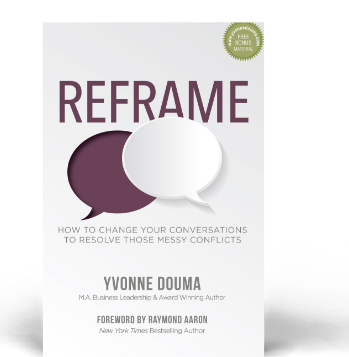I’d like you to answer two questions.
How much time do you spend bickering at work, either face-to-face with colleagues or behind each other’s backs?
And what does all that chaos and drama do to your job satisfaction and quality of life? If you’re the manager or owner, how much is conflict impacting your bottom line?
I see it all the time. When I’m brought in to help manage conflict in a workplace, everyone blames everyone else. Fingers get pointed every which way. And no one blames themselves.
But the reality is that managing workplace conflict (or conflict of any kind) starts with yourself and your own self awareness. This is true whether you’re an employee trying to stake out a great career, or whether you’re a small business owner trying to create a more cohesive, profitable team.
It’s the good news and the bad news, all at once: the buck stops with you. That means you can do a lot to make your worklife much calmer and more peaceful. But it also means you’ve got some work to do.
Here’s where to start.
How To Avoid Sticky Conflicts At Work
Situational awareness is crucial for helping you to resolve any kind of conflict, especially in the workplace. You need to know what you and the other person bring to the relationship in any given situation, as well as any other issues that may increase stress and anxiety in either of you.
Reading body language is vital here. It’s best not to attempt any serious conversation when you can see the other person is upset about something. Give them time to calm down, and offer support in the meantime.
Timing also matters. After all, you wouldn’t attempt a serious discussion on parenting styles while your partner is glued to the television watching a Super Bowl Game! Nor would you ask your boss for a raise when she is up to her eyeballs in quarterly reports. Or would you? These are not examples of communication-friendly environments. So instead, it’s best to wait for a time when you have your partner’s full attention, if you want to help ensure a more positive outcome.

Sometimes, it’s better to comfort a colleague than to ‘hash it out.’
Keeping Your Brain Calm During Conflict
Of course, even the most zenlike offices staffed with the most self-aware people will still run into conflict from time to time. So when you do run into (inevitable) conflict, do your level best to stay calm.
The Harvard Business Review suggests four steps to calm your brain and manage yourself during conflict:
- Stay present. Be aware if you are feeling provoked by noticing your body cues. Think of a visual cue such as your ‘happy place,’ which can be a place or even a person that makes you feel good just by thinking about them.
- Let go of the ‘story.’ Even if you feel threatened, try to let go of your thinking or judging mind, as it often fills up with stories and thoughts about what is happening at the moment, most of which won’t actually be helpful.
- Focus on your body. Be open to focusing on sensations in your body – even if they are uncomfortable.
- Finally, breathe! Try to breathe slowly and rhythmically, using the same number of counts for your exhale as your inhale (e.g., inhale 1-2-3-4, hold 1-2-3-4, exhale 1-2-3-4 – and go longer if you can!). Science tells us that deep breathing can change our physiology. For example, slowing down our breath can slow down our heart rate and calm our brain, allowing us to focus better.
So before walking into a stressful situation, take ten deep breaths with every inhalation, visualize that you are breathing in confidence and success. With every exhalation, visualize you are breathing out fear and anxiety. You’ll be surprised what a difference this can make.
Techniques to Use When You Become Triggered
I’d like to reiterate that no one has to be perfect, and that includes you. Working through conflict can be difficult and even downright scary. Sometimes, we all let ourselves get pushed a little too far, and we get triggered.
The key is not to beat yourself for getting triggered – this will just make things worse! Instead, here are strategies you can implement to provide yourself with some relief.
- Practice relaxation techniques (deep breathing, meditation, grounding exercises, aromatherapy, music, affirmations, visualizing your happy place)
- Call someone if you are feeling triggered (have a list of people you can call whenever you need them for support)
- Keep a journal (this helps you to process your feelings and recognize which situations are triggering for you)
- Become aware of your triggers (be mindful and write down what situations or people tend to trigger you)
- Anticipate and plan a coping strategy for triggers (as you become more self-aware, you will be able to anticipate your triggers better)
- Exercise regularly (this helps to reduce stress)
Prevention is Key!
Being able to deal with conflict and manage yourself effectively will help you maintain control in your life, helping save your relationships and your job (and maybe your business).
I would be remiss if I didn’t mention the importance of prevention, which means planning ahead. If you accept that stress and conflict will occur at home and work, you can prepare for it. This means learning grounding techniques ahead of time, practicing self-care routines, and having some conflict resources and hacks that help you stay in control.

What self care practices can you work into your daily routine?
So take time now to prepare a list of resources you can rely on when inevitable conflict happens. These can be:
- Grounding techniques (to help you remain present)
- Relaxation techniques (to help you stay calm)
- People you can call (your best friend, therapist or communication coach!)
- Tools you can use (e.g., rescue remedy)
- Skills you could learn (e.g., public speaking, assertiveness training, communication skills)
Sometimes just knowing you have options will help you to remain calm during conflict. And the calmer you can stay, the calmer everyone else can be, too.
Remember that when you’re in a panicked and triggered state, it’s not just bad for you. It’s also impossible for you to be a helpful colleague. Therefore, using self-care resources is key to helping you maintain your relationships and be the leader and colleague you aspire to be.
Finally, you don’t have to ‘go it alone.’ I love helping individuals and small businesses deal with all their ‘stuff,’ so they can move on to success they deserve.

